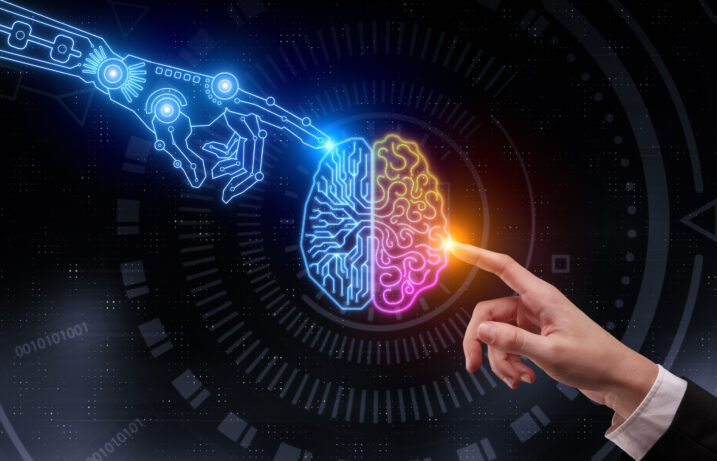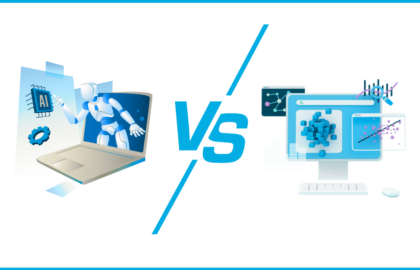A career in artificial intelligence isn’t just about working with cutting-edge technology. It’s also about solving real-world problems, improving lives, and shaping the future. As industries continue to adopt AI at a rapid pace, the demand for skilled professionals is growing across sectors like healthcare, retail, and finance. Whether you’re passionate about machine learning, data analysis, or intelligent systems, there’s a place for you in this dynamic field.
In this blog, we’ll break down how to prepare for a career in AI and explore the exciting ways it’s being applied in today’s workforce.
Identify Your Strengths and Interests
Artificial intelligence is a vast and multifaceted field, spanning everything from machine learning and robotics to natural language processing and computer vision. Start by reflecting on what excites you most:
- Do you love solving challenging problems with algorithms and mathematical models?
- Are you drawn to understanding and improving how humans interact with technology?
- Do you find joy in analyzing massive datasets to uncover patterns and insights?
- Are you fascinated by enabling machines to perceive and interpret the world, like recognizing images or understanding speech?
Pinpointing your unique strengths and personal interests will guide you toward the AI subfields that best align with your passion and talents. This focused approach will not only make your learning journey more enjoyable but also set you up for success in a career where you can excel and make meaningful contributions.
Develop a Strong Foundation in Computer Science
A successful career in AI starts with a solid grasp of core computer science concepts, including programming, data structures, algorithms, and computational theory. These fundamentals are essential for understanding how to design and implement efficient, effective AI systems.
Pursuing an education in computer science, software engineering, information technology, or a related field will give you a comprehensive education in these areas. Through coursework and hands-on projects, you’ll learn to think like a developer, solve complex problems, and write clean, optimized code, all skills that are indispensable in any AI role.
In addition to formal education, consider building your foundational knowledge by:
- Practicing coding in languages widely used in AI, like Python, Java, or C++.
- Completing online tutorials, coding bootcamps, or open-source contributions.
- Exploring algorithm challenges on platforms like LeetCode, HackerRank, or Topcoder to sharpen your problem-solving abilities.
By establishing a strong computer science base, you’ll be well-prepared to dive deeper into specialized AI topics and technologies.
Deepen Your Expertise with AI-Focused Courses and Certifications:
To build specialized skills for an AI career, enroll in courses, bootcamps, or certification programs, tech companies, and online platforms. These programs provide hands-on experience in key areas such as machine learning, deep learning, computer vision, and natural language processing (NLP), helping you stay current with the latest tools and techniques.
Build a Strong Portfolio:
Demonstrate your AI expertise by working on diverse, hands-on projects. Participate in hackathons to solve real-world problems under time constraints, contribute to open-source AI initiatives to gain collaborative experience, or develop your own projects using popular AI tools and frameworks. A well-documented portfolio not only showcases your technical abilities but also highlights your creativity, problem-solving skills, and passion for AI, all qualities that employers and collaborators value.
Now that you’ve explored the foundational steps to begin your career in AI, from identifying your interests and building technical skills to gaining hands-on experience, it’s equally important to see how these skills are applied in real-world settings. Across industries, AI is being used to solve complex challenges, improve efficiency, and drive innovation. In the next section, we’ll look at how AI is transforming key sectors such as healthcare, retail, and finance, and how your growing expertise can contribute to these advancements.
The Application of AI in Healthcare Industry
The healthcare industry is emerging as one of the most promising and transformative sectors for artificial intelligence (AI) applications. AI is being integrated into healthcare in several impactful ways, including:
- Predictive Diagnostics: AI algorithms can analyze patient data to detect early signs of diseases, such as cancer or heart conditions, before symptoms become severe, enabling earlier and more effective interventions.
- Personalized Treatment Planning: Machine learning models can recommend tailored treatment plans based on a patient’s unique medical history, genetic profile, and lifestyle, improving outcomes and reducing trial-and-error approaches.
- Medical Image Analysis: AI-powered tools can interpret medical imaging (e.g., X-rays, MRIs, CT scans) with high accuracy, assisting radiologists in identifying abnormalities more quickly and precisely.
- Drug Discovery and Development: AI accelerates the identification of promising drug candidates and optimizes clinical trial designs, significantly shortening the time and cost involved in bringing new therapies to market.
- Remote Patient Monitoring: Wearable devices and smart sensors collect real-time health data, which AI systems analyze to monitor patient conditions remotely, helping with chronic disease management, early warning alerts, and reducing hospital readmissions.
The Application of AI in Retail Industry
The retail industry is experiencing a major transformation driven by the integration of artificial intelligence (AI) technologies.
Key AI innovations reshaping the retail landscape include:
- Personalized Product Recommendations: AI algorithms analyze customer browsing history, purchase behavior, and preferences to deliver tailored product suggestions, enhancing user satisfaction and increasing conversion rates.
- Inventory Management: AI-driven systems help retailers optimize stock levels by predicting demand trends, reducing overstock and stockouts, and improving supply chain efficiency.
- Dynamic Pricing Strategies: Machine learning models monitor market trends, competitor pricing, and customer behavior to adjust prices in real time, maximizing profitability and competitiveness.
- Customer Behavior Prediction: AI tools gather and interpret large volumes of customer data to forecast purchasing patterns, allowing retailers to make more informed marketing and sales decisions.
- Augmented Reality (AR) Shopping Experiences: Retailers are combining AI with AR technology to let customers virtually try on products, such as clothing, accessories, or home decor, before purchasing, enhancing engagement and reducing returns.
Industry giants like Amazon and Alibaba have set the standard by leveraging AI to streamline operations and revolutionize the customer journey. Their use of intelligent recommendation systems, facial recognition payment, and predictive analytics exemplifies how AI can create more intuitive, responsive, and satisfying shopping experiences.
The Application of AI in Finance Industry
AI in Finance: Transforming Risk Management and Customer Experience
The financial services industry has been at the forefront of adopting artificial intelligence (AI), recognizing its potential to drive efficiency, accuracy, and innovation.
Key AI applications transforming finance include:
- Fraud Detection Systems: AI algorithms analyze transaction patterns in real time to detect anomalies and flag potentially fraudulent activity, significantly reducing financial losses and enhancing security.
- Algorithmic Trading: High-frequency trading platforms powered by AI can execute trades within milliseconds, responding to market fluctuations faster than human traders and identifying complex trading opportunities based on large datasets.
- Customer Service Chatbots: AI-driven virtual assistants handle routine customer inquiries, provide instant support, and guide users through banking services, improving customer satisfaction while reducing staffing costs.
- Credit Scoring Models: AI evaluates a wider range of data, including social, behavioral, and transactional patterns, to generate more accurate and inclusive credit scores, improving loan accessibility and reducing default risks.
- Risk Assessment Algorithms: Financial institutions use AI to assess and model risk more effectively by analyzing historical data, market trends, and economic indicators, enabling smarter investment decisions and compliance monitoring.
Industry leaders such as JPMorgan Chase, Goldman Sachs, and PayPal are already demonstrating the power of AI in finance. These institutions are utilizing AI to deliver personalized financial advice, automate routine tasks, streamline regulatory compliance, and design more sophisticated risk management frameworks, all contributing to a more agile, secure, and customer-centric financial ecosystem.
Launch Your Future in AI: Start with the Right Training
AI is changing the world and you can be part of it. Whether you’re drawn to healthcare innovation, smarter solutions, or breakthroughs in financial technology, a career in AI offers limitless possibilities to make an impact.
By investing in your education and hands-on experience now, you’ll be ready to lead the future of this intriguing field. If you’re ready to turn your passion into a profession, consider applying to an AI bootcamp program.
Flatiron School’s immersive, fast-paced Advanced AI & Machine Learning Bootcamp offers the technical training, hands-on project experience, and mentorship you need to launch a successful career. Don’t wait and apply today!
Frequently Asked Questions
How can I keep up with the fast pace of AI?
The field of AI evolves rapidly, but you can stay current without feeling overwhelmed. Set a manageable weekly goal, such as completing one tutorial, reading one new paper or blog summary, and making progress on a personal project. Following a few trusted thought AI leaders and publications can help you filter the noise and focus on what truly matters.
How does a data professional use AI ethically?
Ethical AI practice involves a commitment to fairness, transparency, and accountability. This means following privacy laws, minimizing the use of personally identifiable information (PII), ensuring you have consent for data use, actively testing for and mitigating bias in your models, and maintaining human oversight in critical decision-making processes.
How should I prepare for an AI job interview?
Your preparation should cover several areas. For the technical portion, practice your Python and SQL coding skills and review machine learning fundamentals. Be ready to walk through your portfolio projects, explaining your process, metrics, and the final business impact. For behavioral questions, use the STAR (Situation, Task, Action, Result) method to structure your answers and highlight your achievements.
Can I transition to AI from a non-technical background?
Absolutely. Many successful AI professionals and Flatiron School alumni started in fields like business, healthcare, customer service, or the humanities. Begin by strengthening your programming and math skills while applying your domain expertise to real-world, data-driven projects. Leverage your past experience to identify unique AI applications in your industry and consider enrolling in a guided learning program to build technical skills step by step.
How do I choose between PyTorch and TensorFlow?
Both PyTorch and TensorFlow are widely used deep learning frameworks with extensive communities and resources. PyTorch tends to be favored by researchers and beginners for its intuitive syntax and dynamic computation graph, making it easier to debug and prototype. TensorFlow is often chosen in industry settings for production deployment, scalability, and integration with tools like TensorFlow Lite and TensorFlow Serving. Try both on small projects to see which matches your learning style and goals; the experience will help you understand their respective strengths.




